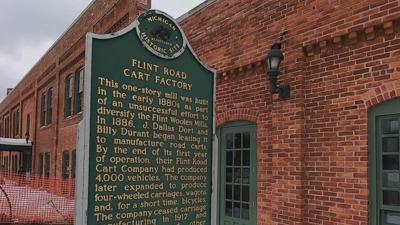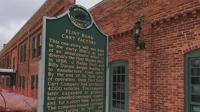The Michigan Historical Commission is taking a fresh look at 1,700 historical markers around the state to make sure they accurately the stories.
LANSING, Mich. (WJRT) - Michigan has a rich history and much of it is documented on more than 1,700 historical markers in communities across the state.
The Michigan Historical Commission is examining each one of those markers to make sure they tell the whole story in light of an increased emphasis on diversity and inclusion.
The commission has found that not all stories are being told and some stories are incomplete.
"Every community, when you get down to it, has an interesting history," said Michigan History Center Director Sandra Clark.
The markers tell unique stories ranging from people who left for the 1800s Gold Rush in California to people who stayed in Michigan and left their mark on society.
"These markers really give the community kind of a common history to talk about, because so many people see them," Clark said.
In short essay form, the markers tell the stories of people, places and events that are woven into the fabric of a community's history.
"The markers are purchased by local people, by organizations and people have been buying these markers and supporting this program since 1955," Clark said.
The Michigan Historical Commission is on a mission to complete some stories and discover others that are significant to the state's history. They are embarking on a years-long project to audit every historical marker.
"We know that its going to reveal that they are not as inclusive as we want them to be," Clark said. "Some of it is social, some is economics, some is about race, gender -- all of the different ways we have told some stories and not other stories."
The audit began on Mackinac Island.
"So, it was kind of it was a small collection of markers and kind of an easy first place to start," Clark said. "So we worked with the community a little bit and worked with our advisers and we actually picked four markers that we thought really needed to be changed."
One of the markers pays homage to the Biddle family.
"They mentioned the Biddle's wife was Native American but they didn't mention her name," Clark said. "So the new marker talks about Agatha Biddle, who was very important to the success of the enterprise."
She said the markers are an integral part of Michigan's future while they document history.
"They educate our children and, like I say, they give us kind of a common starting point for big conversation that we need to have as we talk about our future," Clark said.
Conversations about inclusion and diversity are about finding space for everyone's story to be told.
"We understand there are things that have happened that people carry with them and until we make space for that we can't really have good conversation," Clark said.
In Genesee County, markers run the gamut. There are dozens of historical markers documenting contributions by faith leaders, organizations, the automotive history and the founder of Flint.
The Genesee County Courthouse lawn has a marker documenting the city of Flint's role in the the Underground Railroad and paying homage to those who had the courage to resist slavery.
"A story about one of the escaped, Robert Cromwell, so that's the kind of story we may be adding in other communities that Flint already has," Clark said. "But I am sure there are other stories in Flint and other groups that really haven't been featured on the markers yet and need to be."
This effort to make the historical markers more diverse and inclusive comes at a time when America is conflict with itself about some of its history. People on all sides differ about how to tell the history and what parts of the story to tell.
Clark said the goal is to not leave any parts out.
"You know, we have markers of other examples great lakes and all of them start out with a name of a Frenchman who first discovered this Great Lake," she said. "Well of course there were some folks here who knew all about that Great Lake and the Frenchman probably would have gotten lost without the aid of of those people who knew those lakes so well."
Clark said the effort to re-evaluate historical markers is not about taking away history, it is about adding the history and broadening the story.
This audit of every historical marker in the state is expected to take years. But the commission is committed to seeing it through to completion.
Click here to learn more about the historical markers and perhaps having a story featured. The markers cost anywhere between $2,000 and $4,000.














